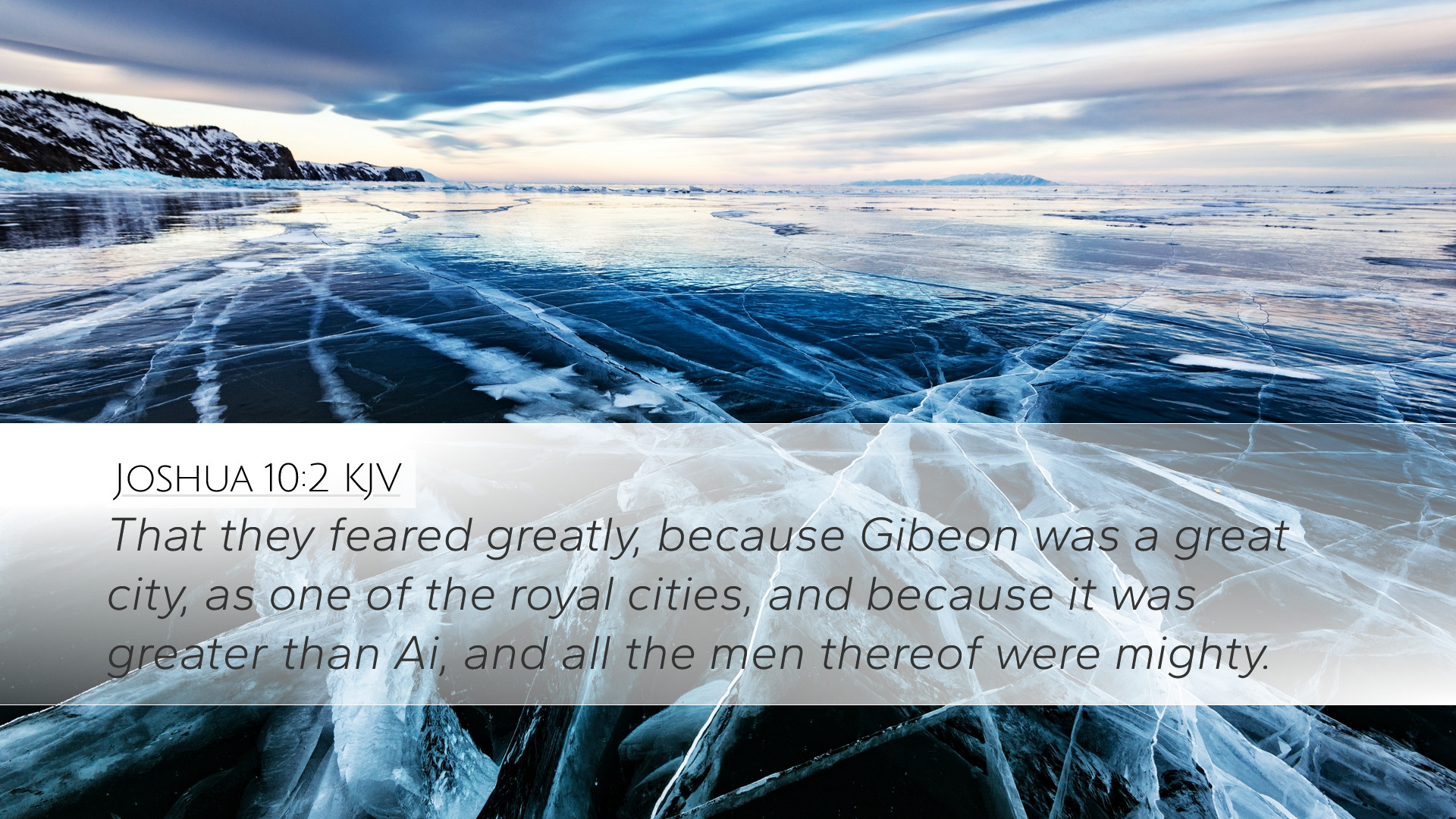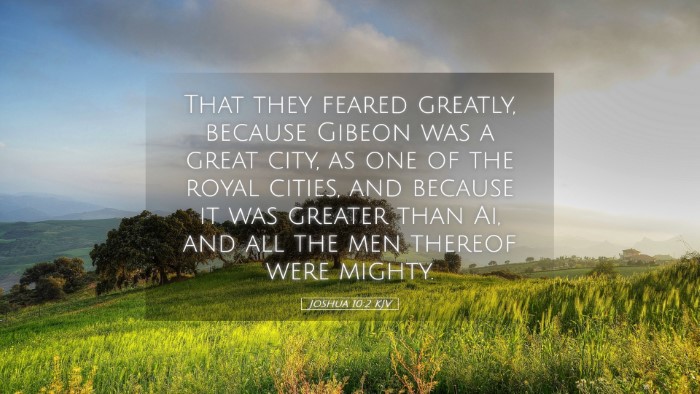Bible Commentary on Joshua 10:2
Verse: "That they feared greatly, because Gibeon had made peace with Israel and was among them."
Introduction
The narrative of Gibeon's alliance with Israel is pivotal within the book of Joshua as it marks a significant shift in the dynamics of the promised land's conquest. In this verse, the fear of the Amorite kings serves as a backdrop to the overarching theme of God's providence and Israel’s emerging identity as a nation under divine favor. This commentary draws from classic public domain sources, including works by Matthew Henry, Albert Barnes, and Adam Clarke, elucidating the implications of this fear and the geopolitical landscape it created.
Contextual Analysis
The events of Joshua 10 transpire following Israel’s miraculous victories and their increasingly formidable presence in Canaan. Gibeon's feigned allegiance underscores their recognition of the imminent threat that Israel posed. The decisive choice to align with the Israelites—rather than oppose them—illustrates not only the cunning of the Gibeonites but also the fear that gripped the hearts of the Canaanite leaders.
Historical Background
Joshua 10:1-4 sets the stage for the coalition of the five Amorite kings, indicating their desperation to counterbalance the alliance formed between Israel and Gibeon. The Gibeonites, as highlighted by Matthew Henry, were aware of the reputation of Israel's might, which had spread across the region due to their previous victories at Jericho and Ai. This fear was not without basis; it stemmed not only from Israel's military actions but also from the miraculous judgment wrought by God.
Insights from Public Domain Commentaries
Matthew Henry's Perspective
Matthew Henry emphasizes the psychological ramifications of Gibeon's peace treaty with Israel. He notes that the Gibeonites sought a survival strategy, recognizing that resistance would lead to inevitable destruction. Their choice to seek peace was a reflection of the divine plan at work; God was orchestrating events to fulfill His promises to Israel. Henry also points out that the fear of the Gibeonites was not limited to their own fate but spread among other Canaanite nations, showcasing that the knowledge of God’s power had a ripple effect across the land.
Albert Barnes' Commentary
Albert Barnes further elaborates on the significance of this fear among the Amorite kings. He correlates their fear with the fear of the nations that surrounded Israel, acknowledging that the miracle of Gibeon's deliverance instilled dread in the hearts of the adversaries of God’s people. Barnes suggests that this fear can be traced back to Israel’s past experiences, where their victories signified God's favor. He draws a parallel to how fear can lead to either submission or rebellion—illustrating the diverse responses of different nations to the advancing Israelites.
Adam Clarke’s Contribution
Adam Clarke offers a unique linguistic insight into the term "feared greatly," delving into the original Hebrew language to ascertain the emotional intensity of the fear experienced by the Amorite kings. Clarke posits that their fear was multi-faceted; it encompassed not just the fear of the Israelites but also fear of divine retribution. He notes that this fear was borne out of a recognition of Israel’s covenant relationship with God—underscoring the theological principle that those aligned against God's people ultimately stand against His will.
Theological Implications
This singular verse encapsulates several theological insights that are relevant for modern readers, particularly pastors and theologians:
- Divine Sovereignty: The fear exhibited by the Amorite kings serves as a testament to God’s control over the events of history, as He directs the affairs of nations in alignment with His covenant promises.
- Covenant Identity: Gibeon’s choice to make peace reveals the importance of understanding one's identity in covenant relationship, a theme relevant for understanding the New Testament church's identity in Christ.
- God's Reputation among Nations: The fear that spread across the land represents not just an emotional response but a recognition of God's power and His people’s influence in the world—a call for believers today to live in a manner deserving of such a reputation.
Practical Applications
For pastors, students, and scholars, the reflections on Joshua 10:2 are not merely academic pursuits but avenues for spiritual growth and practical application:
- Encouragement in Facing Battles: Just as the Gibeonites found a strategy in submission through peace, contemporary believers can find victory in surrender to God's leading in their lives.
- Advocating for Peace: The manner in which Gibeon sought peace can be an example for Christians to pursue reconciliation both within the church and in broader societal contexts.
- Understanding Our Influence: Believers are reminded of their call to represent Christ authentically, recognizing that their actions can influence others’ perceptions of God’s power and love.
Conclusion
The fear that overtook the Amorite kings in Joshua 10:2 serves not only as historical commentary but also as an enduring lesson on faith, divine favor, and human response to God’s sovereignty. As the narrative unfolds, it is clear that God uses fear as a tool to accomplish His purposes, leading nations to either submit or rebel against His will. In all, this verse challenges us to reflect on our own lives: Are we aligning ourselves with God’s people? Are we living in light of His power, and do we recognize the broader implications of our covenant relationship with Him?


